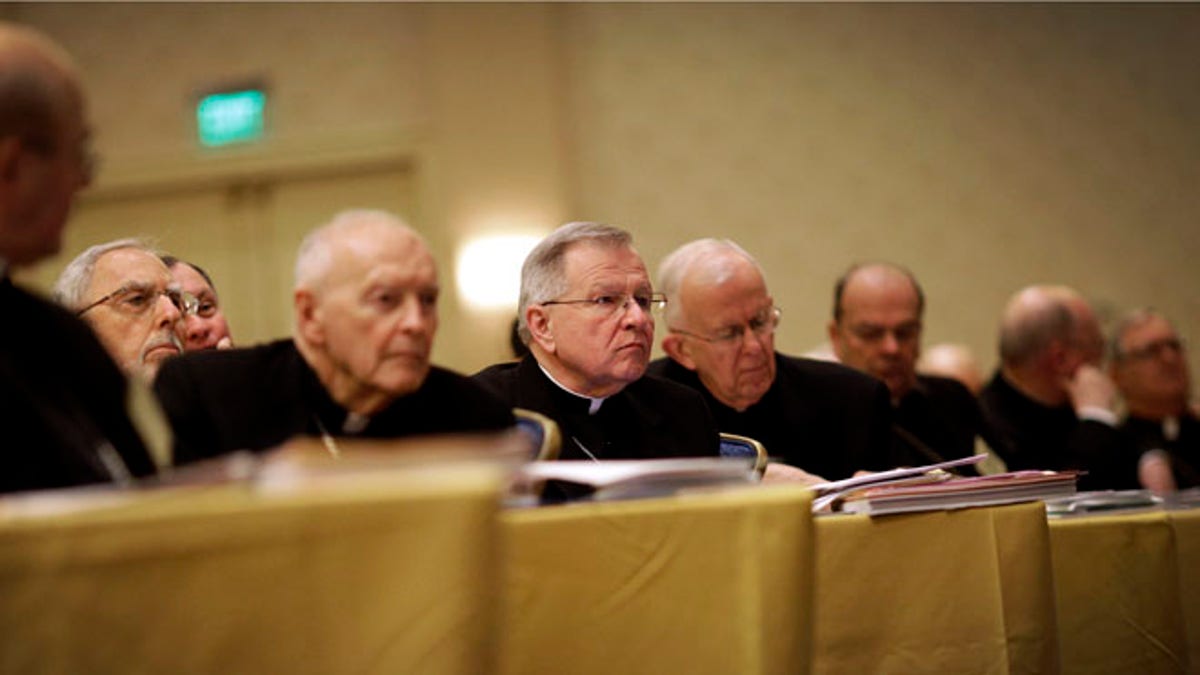
Nov. 11, 2013: Archbishop Gregory Aymond of New Orleans, center, listens to a report as he sits with fellow bishops at the United States Conference of Catholic Bishops' annual fall meeting in Baltimore. (AP)
The Vatican ambassador to the U.S., addressing American bishops at their first national meeting since Pope Francis was elected, said Monday they should not "follow a particular ideology" and should make Roman Catholics feel more welcome in church.
Archbishop Carlo Maria Vigano noted the challenges from broader society to Christian teaching. He cautioned that the bishops' witness to faith would be undermined if they failed to live simply. Francis, in office for eight months, has captured attention for eschewing some of the pomp of the papacy, including his decision to live in the Vatican hotel and his use of an economy car.
"There has to be a noticeable lifestyle characterized by simplicity and holiness of life. This is a sure way to bring our people to an awareness of the truth of our message," said Vigano, the apostolic nuncio based in Washington.
"The Holy Father wants bishops in tune with their people," Vigano said, noting that he visited the pope in June. "He made a special point of saying that he wants pastoral bishops, not bishops who profess or follow a particular ideology."
In a September interview, Francis said Catholic leaders should give greater emphasis to compassion, arguing the church's focus on abortion, marriage and contraception has been too narrow and alienating. For the last several years, the public sessions of the fall bishops' assembly have centered on those issues. This year's meeting gave the first glimpse of how that message was resonating among American leaders.
New York Cardinal Timothy Dolan, president of the U.S. Conference of Catholic Bishops, dedicated his speech to persecuted Christians overseas, asking the bishops to make international religious freedom a top priority. He made only a passing reference to the bishops' own religious freedom campaign, and then only to say that their struggles "pale in comparison" to the plight of Christians and others overseas.
Dozens of Catholic charities and dioceses, along with evangelical colleges and others, are suing the Obama administration over a requirement that employers provide health insurance that includes contraceptive coverage. The bishops say the religious exemption to the rule violates the religious freedom of nonprofit and for-profit employers. The issue is expected to reach the Supreme Court.
In a news conference after the speech, Dolan said his speech was not a shift away from that fight — but an expansion of it. "It's almost raised our consciousness to say we can't stop here," Dolan said.
Several bishops in the general discussion urged fellow church leaders to heed Francis' call for more attention to the poor. After a presentation on the priorities of the conference, Archbishop Joseph Fiorenza, a former president of the bishops' conference, rose to say it was "missing this essential element" of a focus on the poor. "It would help our conference be on record as trying to achieve what Pope Francis has put before us."
Dolan is at the end of this three-year term as conference president. His successor will be elected Tuesday, the final day of the public part of the meeting.

